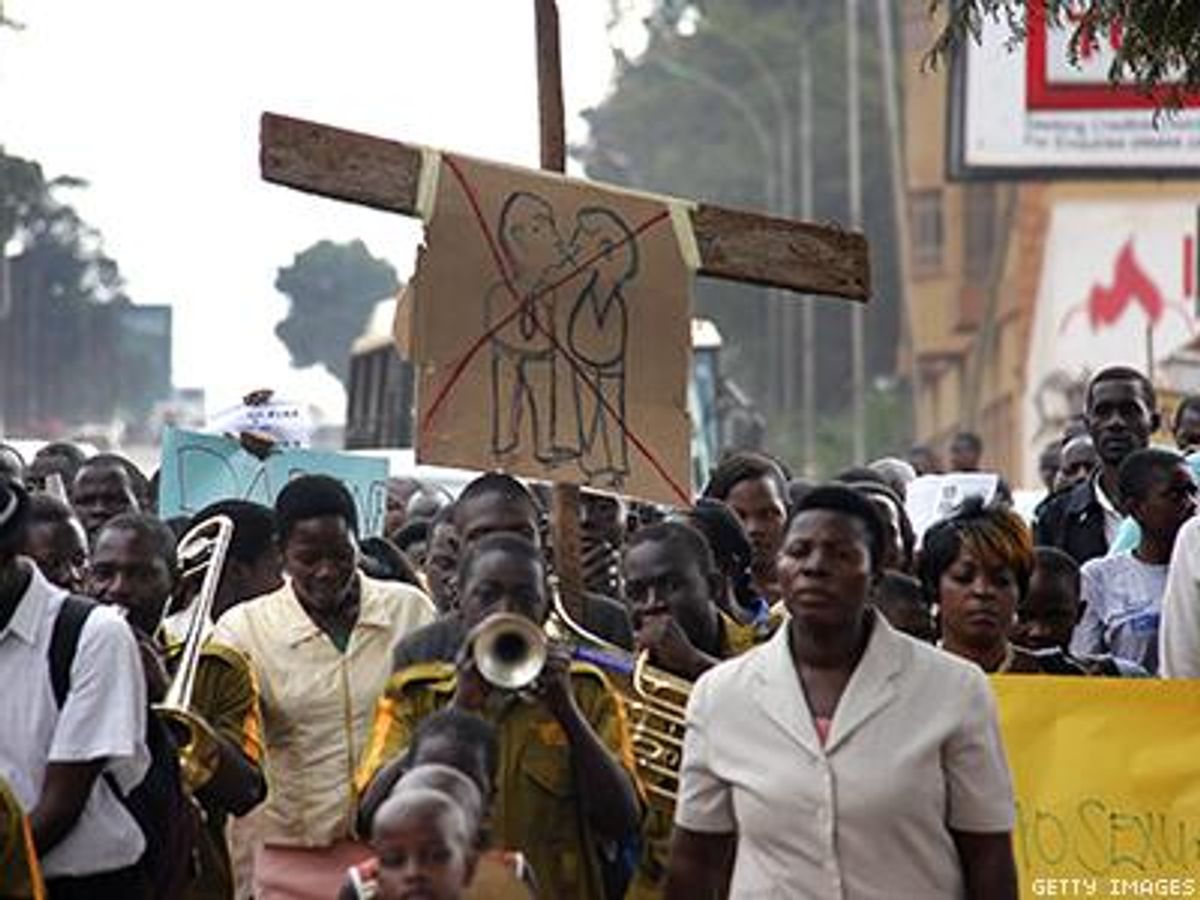A Ugandan lawmaker is hoping to regift a homophobic law to the east African nation just in time for Christmas -- more than a year after the original "jail the gays" law was first passed, and nearly four months after it was overturned by Uganda's Constitutional Court on a technicality.
Abdu Latif Ssebagala, a legislator on the parliamentary committee charged with drafting a replacement law for the Anti-Homosexuality Act, told Reuters Friday that a new antigay bill is now ready for a vote.
"The draft is ready and we have strengthened the law, especially in areas of promotion and luring children," Ssebagala told Reuters."Next week we expect to meet the speaker to fix a date for the re-tabling to parliament."
According to the Reuters report, Ssebagala and the parliamentary committee are eager to pass the bill within weeks so that the country "can celebrate it as a Christmas gift."
That's language eerily reminiscent of a promise made in 2012 by then-Speaker of Parliament Rebecca Kadaga, who promised conservative Christians in Parliament and society in general that she would pass the bill "as a Christmas gift" to Uganda.
Ultimately, it took nearly a year before the bill did indeed pass Kadaga's Parliament on December 20, 2013 -- with just 96 hours to spare before Christmas Day, a year later than it had been promised. The bill was passed without any public notice, prompting international rights organizations to question its legitimacy. In the end, it was the lack of a quorum that led to its demise. In August, a Constitutional Court in the capital city of Kampala struck down the Anti-Homosexuality Act on those procedural grounds, just six months after President Yoweri Museveni signed it into law in February.
The court did not rule on the merits of the law, leaving a legal window for the conservative Christians who dominate in Uganda's parliament to simply re-introduce similar legislation and pass it with the required number of lawmakers present. While the draft of the new bill has yet to be made public, some observers have expressed concern that the revised version of the so-called jail the gays bill could be even harsher than its predecessor, which prescribed lifelong jail sentences for anyone convicted of "aggravated homosexuality," which included repeat "offenders" and anyone who was HIV-positive, a minor, mentally disabled, or under the influence of drugs or alcohol.
The first iteration of the notorious, draconian law, introduced in 2009, called for the death sentence for those convicted of "aggravated homosexuality," earning the legislation the moniker of Uganda's "kill the gays" bill. That capital punishment provision was ultimately reduced to life imprisonment following international outrage, though the version that ultimately passed did maintain an earlier stipulation that imposed jail sentences for anyone who does not report a "known homosexual" to police.
Although Uganda, like many countries in sub-Saharan Africa, is a deeply religious and conservative society, the perverse irony of passing a hateful, stigmatizing law "as a Christmas gift" seems to be lost on the powerful religious forces that influence Uganda's Parliament, and on its dictatorial president.
But President Yoweri Museveni is not known for his political pragmatism. The former general seized power following a military rebellion he helped lead in 1986 and has ruled Uganda largely unchallenged since that time. Whether or not he will sign a new antigay bill is uncertain -- though it is likely informed by the president's presumed aspirations to run for reelection in 2016. That contest could mark Museveni's first serious reelection campaign since seizing control 28 years ago.
As Reuters reports, Museveni is walking a political tightrope with regard to the new antihomosexuality bill. Museveni is keenly aware of the political backlash that befell his country in the wake of his signature on the Anti-Homosexuality Act of 2014, which saw tens of millions in aid dollars suddenly vanish from Western and European nations, including Sweden, Norway, Denmark, the Netherlands, and ultimately, the United States. Such foreign aid makes up a full 20 percent of the country's budget and helps prop up Museveni's administration, notes Reuters.
Despite the international outrage at the law's enactment, Museveni was actually greeted by throngs of cheering Ugandans who carried him through the streets of Kampala in a five-hour celebration of "thanksgiving" after he signed the Anti-Homosexuality Act in February. A repeat of such adulation could prove a campaign stunt too tempting to decline.
A spokesman for Museveni told Reuters that his boss is a democrat who had not yet made his views on possible new antigay legislation known. "We'll only know his views when the new law is passed and is sent to him for signing," Tamale Mirundi told the news service.
If Museveni does sign such a bill, it would likely spark a similar response from international human rights organizations, which pressured the Obama administration to apply diplomatic and economic pressure on Uganda to repeal the law.
Ultimately, the administration did just that, canceling several medical programs, redirecting funds from government agencies to advocacy groups, and adding a measure of military pressure as well by canceling a set of coveted joint training exercises with the U.S. Armed Forces and those of Uganda.


















































































Viral post saying Republicans 'have two daddies now' has MAGA hot and bothered